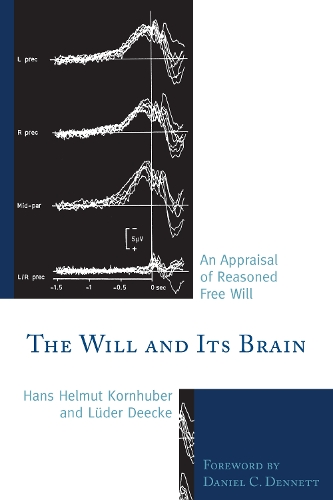
The Will and its Brain: An Appraisal of Reasoned Free Will
(Paperback)
Publishing Details
The Will and its Brain: An Appraisal of Reasoned Free Will
By (Author) Hans Helmut Kornhuber
By (author) Lder Deecke
University Press of America
University Press of America
11th September 2012
United States
Classifications
Professional and Scholarly
Non Fiction
Cognition and cognitive psychology
612.8
Physical Properties
Paperback
110
Width 149mm, Height 230mm, Spine 10mm
209g
Description
In 19641965, Hans Helmut Kornhuber and Lder Deecke achieved a scientific breakthrough with the discovery of the Bereitschaftspotential (BP), or readiness potential. In The Will and its Brain, Kornhuber and Deecke present evidence that proves we can record activity from the human brain occurring prior to our volitional movements or actions. Such preparatory activity is generated by specific brain regions, particularly by the supplementary motor area (SMA) of the frontal lobe, which lies on the inner surface of the brain between the hemispheres. The primary (precentral) motor cortex (MI) later becomes activated in preparing for action. Consequently, the authors discriminate between two components of the preparatory activity of the Bereitschaftspotential: an early SMA-generated BP1 and a late MI-derived BP2. Between BP1 and BP2, the intentional activity runs over the so-called motor loop via the basal ganglia. Kornhuber and Deecke discuss these and other brain processing systems while focusing on the concept of free will. They claim that we, indeed, have free will. It may not be absolutely free, but free in terms of degrees. We can take efforts to increase our degrees of freedom through self-improvement, but we can also lose degrees of freedom through self-mismanagement.
Reviews
. . . required reading for anybody interested in what neuroscience has to say about our capacity to make responsible decisions and be captains of our own destiny. -- Daniel C. Dennett, Tufts University
Author Bio
Hans Helmut Kornhuber was born in 1928 in Knigsberg, Germany, and passed away in 2009. He was a brilliant neurologist and neurophysiologist known worldwide. After his release in 1949 from a Russian prisoner of war camp, he studied medicine in Munich, Gttingen, Freiburg, Heidelberg, and Basel. He was trained in clinical neurophysiology at the Neurological University Hospital in Freiburg and became full professor of neurology at the University of Ulm, Germany in 1966.
Lder Deecke was born in 1938 in Lohe, Germany. He studied medicine at the universities of Freiburg, Hamburg, and Vienna. He received his clinical education at the Neurological University Hospital in Freiburg and at the University of Ulm. Deecke became full professor of neurology and head of the Neurological University Hospital in Vienna in 1985. In 1990, he founded and subsequently chaired the Ludwig Boltzmann Institute for Functional Brain Topography.
